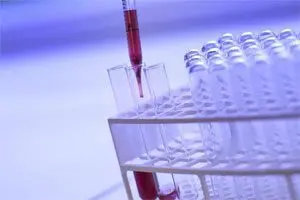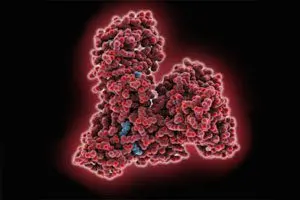Contents

Hypoalbuminemia is a pathological condition of the body in which the level of albumin in the serum part of the blood decreases below 35 g / l. Hypoalbuminemia is a type of hypoproteinemia in which there is a drop in all blood proteins. Most often, nephrotic syndrome, nutritional errors with developing dystrophy, renal and hepatic failure, and sepsis lead to a decrease in serum albumin levels. All these conditions pose a threat to human health and require emergency treatment. Hypoalbuminemia acts as a symptom of such disorders in the body.
Causes of hypoalbuminemia

Hypoalbuminemia develops due to pathological causes, among which are:
Inflammatory processes in the body of acute and chronic course. Cancerous tumors, vasculitis, parasitic and bacterial infections, bacterial endocarditis and rheumatism can lead to a decrease in albumin levels.
The level of albumin in the blood decreases in patients who suffer from inflammation of the mucous membrane of the stomach and intestines (ulcerative lesions, colitis, gastritis, enteritis, cancerous tumors, etc.). In addition, the postponed resection of the stomach leads to a deterioration in the process of albumin absorption.
Albumin deficiency is observed in patients with an abnormal structure of the esophagus.
With liver damage, the level of albumins always decreases, since it is this organ that is responsible for their production. These include cirrhosis, hepatitis, and any condition that accompanies liver failure.
Hypoalbuminemia leads to heart failure.
Nephrotic syndrome is always combined with hypoalbuminemia. It develops in diseases such as glomerulonephritis, amyloidosis, and diabetes mellitus.
If a person follows the strictest diets with a sharp restriction of protein foods and during starvation, a drop in the level of albumin in the blood will be observed.
Extensive soft tissue lesions, such as burns and abscesses, are one of the causes of albumin deficiency in the blood.
Renal failure will lead to hypoalbuminemia.
Massive bleeding causes the development of hypoalbuminemia due to the fact that the protein leaves the body along with the blood.
It is dangerous to follow a diet low in protein for those people who suffer from pancreatitis, gastric ulcer and duodenal ulcer, gout and chronic renal failure. In this case, hypoalbuminemia will develop very quickly, and getting rid of it will be quite difficult.
The symptom is hypoalbuminemia

Albumin is the main protein in the blood. Among other plasma proteins, it occupies almost 60%. Albumin is produced in the liver and is responsible for many functions. Thanks to this protein, the volume of circulating blood and its oncotic pressure are maintained. Albumins carry many important substances that allow the body to function normally. It is responsible for binding cholesterol, bilirubin, calcium, magnesium. Albumin transports carbohydrates, thyroid and adrenal hormones.
With a decrease in the level of albumin in the blood plasma, those substances that it most often binds and transports remain without their usual carrier. Their blood levels also begin to decline, but physiologically active fractions are still able to maintain their normal levels for some time. As a result, the first signs of pathology will begin to appear a little later.
Not surprisingly, severe hypoalbuminemia is manifested by serious symptoms, including:
The formation of edema. They occur primarily in the lower extremities. Edema is soft and symmetrical. They are formed due to a drop in plasma oncotic pressure.
Changes in the acid-base balance of blood plasma, which is accompanied by multiple disorders in the body, up to the development of coma.
Heart rhythm disturbances.
Strengthening weakness.
Decreased appetite.
The development of dyspnoea.
If the fluid leaks into the abdominal cavity due to a decrease in oncotic pressure, then the patient develops ascites.
All of these symptoms are associated with a risk of severe complications, so patients with hypoalbuminemia require immediate treatment.
Diagnosis of hypoalbuminemia

Normally, the level of albumin in the blood plasma should vary between 35-55 g / l. It makes up 54-65% of all blood proteins. Depending on age, albumin values may vary slightly. Therefore, in relation to children from 7 days to 5 years of age, hypoalbuminemia is said to occur when the level of this protein drops to 33 g / l. For older people, the lower limit of the norm is 35-37 g / l.
To determine the level of albumin, blood is taken from patients in the morning on an empty stomach. If the analysis is carried out solely to calculate this protein fraction, then a number of features must be taken into account that can lead to an increase in albumin by 10-15%. So, too hard work with a fist, prolonged clamping of the vessel with a tourniquet and excessive physical overstrain can distort the results of the examination. The patient 12 hours before the procedure should refuse to eat and from intense training.
Treatment of hypoalbuminemia

Treatment of hypoalbuminemia involves addressing the causes that provoked a decrease in the level of albumin in the blood. This will restore protein levels to the physiological norm.
If this symptom is the result of nutritional errors, then it is necessary to adjust the patient’s menu, enriching it with protein-rich foods. First of all, these are eggs, meat, milk, cheeses.
In severe cases, when it is not possible to increase the protein level in a short time, albumin is administered intravenously.
Therapy can take place in the following areas:
Drugs to lower blood pressure are prescribed for hypertensive patients and patients with heart failure.
In case of liver diseases, it is necessary to take hepatoprotectors and enzymes, dieting and avoiding alcohol are also required. With ascites, fluid is pumped out of the abdominal cavity.
Therapy of diseases of the digestive system is carried out with bismuth preparations, proton pump blockers, enzymatic drugs, etc. It is imperative to follow a sparing menu with a sufficient amount of protein products.
Severe burns require symptomatic treatment with antibiotics and pain medications.
In diseases of the kidneys, antibacterial drugs, diuretics are prescribed. Perform hemodialysis as needed.
Any bleeding must be urgently stopped. Patients with severe hypoalbunemia are hospitalized and remain in the hospital until they feel better.









